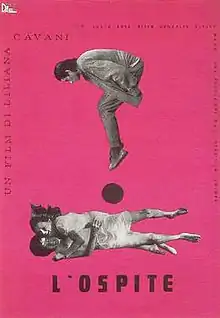| L'ospite | |
|---|---|
 Theatrical release poster | |
| Directed by | Liliana Cavani |
| Written by | Liliana Cavani |
| Starring | Lucia Bosè Glauco Mauri |
| Cinematography | Giulio Albonico |
| Edited by |
|
| Music by | Gioacchino Rossini |
Production companies |
|
| Distributed by | Sacis |
Release date |
|
Running time | 93 minutes |
| Country | Italy |
| Language | Italian |
L'ospite, English title The Guest,[lower-alpha 1] is a 1971 Italian drama film directed by Liliana Cavani and starring Lucia Bosè.[2][3][4] It follows a woman who, released from a mental hospital after twenty years, tries in vain to fit into society.
Plot
Writer Piero does research in a psychiatric hospital for his next novel. He finds several deficiencies in the treatment of the patients, but hears only selfjustifications and criticism when he confronts the doctors with his observations. He takes a particular interest in the case of Anna, a woman who was hospitalised with depression after the death of her cousin twenty years ago, to whom she felt very close. The only person in the institute whom Anna opens up to is fellow inmate Luciano.
Shortly after, Anna is discharged and entrusted to her brother Renato, but after a series of misunderstandings and hostilities from her surroundings, she runs away and hides in an abandoned villa. There, in her fantasy, she relives her relationship with her cousin, who appears in the shape of Luciano. Eventually, she is found by the police and sent back to the hospital.
Cast
- Lucia Bosè as Anna
- Glauco Mauri as Piero
- Peter Gonzales as Luciano
- Alvaro Piccardi as Anna's brother
- Giancarlo Caio as the doctor
- Giampiero Frondini (credited as Gian Piero Frondini)
- Alfio Galardi
- Maddalena Gillia
- Maria Luisa Salmaso
- Lorenzo Piani
Production and release
Cavani had the idea for L'ospite after a screening of her previous film I cannibali for patients of a mental hospital.[2][5] It was produced by the Italian radio and television station RAI, shot on 16 mm film[2][3][4] in black and white[1][6] and blown up to 35 mm film.[4]
L'ospite was presented at the 1971 Venice International Film Festival.[2][3][4] After a theatrical release the following year, it was broadcast on national television on 24 May 1973.[5]
Reception
The day after the film's TV presentation, Ugo Buzzolan of La Stampa praised Cavani's "artistic and civil commitment" and Bosè's performance.[5]
Awards
Notes
References
- 1 2 Cavani, Liliana (director) (1971). L'ospite (Television production) (in Italian). Italy.
- 1 2 3 4 5 6 Marrone, Gaetana (2000). The Gaze and the Labyrinth: The Cinema of Liliana Cavani. Princeton University Press. ISBN 9780691008738.
- 1 2 3 "L'ospite". La biennale di Venezia (in Italian). Retrieved 14 January 2024.
- 1 2 3 4 5 6 "L'ospite". lilianacavani.it (in Italian). Retrieved 14 January 2024.
- 1 2 3 "Omaggio a Lucia Bosè". RAI (in Italian). 28 March 2020. Retrieved 14 January 2024.
- ↑ Mauri, Glauco (2023). Le lacrime della Duse. Ritratto di un artista da vecchio. Falsopiano. p. 87. ISBN 9788893042673.